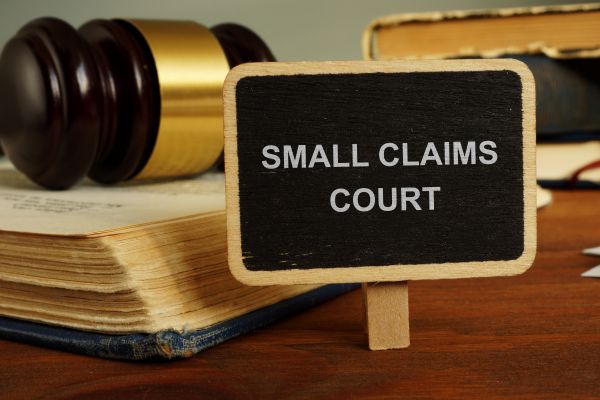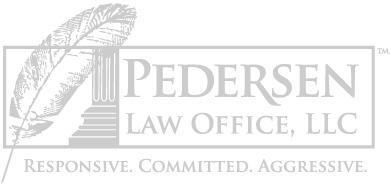Getting Sued by a Creditor in Small Claims Court?
Apr 29, 2025

SMALL CLAIMS COURT
Below is a brief overview of how small claims court works when you are taken to court for an outstanding debt. The exact process can vary depending on the county; be sure to consult local court rules. If you're unsure, consider seeking legal advice or use resources like the Wisconsin Court System's guide.
Summons & Complaint: The summons provides details about the “return date”, which is the initial date you must respond, answer, or appear in court. The complaint provides details about why you are being sued and the amount owed. Carefully review these documents to determine your next steps.
Contesting the Claim: If you disagree with the facts, you must appear in court or file a written Answer explaining why. An Answer and Counterclaim form (SC-5200V) is available on the Wisconsin Court’s website or at the county clerk’s office. You must file your Answer with the court prior to the deadline and follow local rules regarding service. A hearing will be set, and the court will determine the outcome based on the facts presented.
Not Contesting: Unfortunately, not having the money to pay is not a valid reason to contest the claim. If you agree with the facts in the lawsuit, you do not need to appear in court at the small claims return date or file an answer. A default judgment will be entered against you for the amount in the complaint and may also include court costs.
Settlement: If you agree with the claim and have the money to pay it, you can attempt to settle it before the deadline. Contact the creditor or their attorney to work out the details to resolve it. Settling the claim prior to the deadline can prevent a money judgment being entered against you.
Money Judgment: Whether you choose not to fight the claim, or fought it and lost, a money judgment will be entered against you. You will receive a Notice of Entry of Judgment and an Order for Financial Disclosure Statement in the mail. You must fill out the Financial Disclosure Statement and return it to the creditor or their attorney within 15 days. Failure to do so may result in contempt proceedings.
COLLECTION METHODS
The creditor will use the information you provide in the Financial Disclosure Statement to collect from you. Common collection methods include:
Wage Garnishment: A court order requiring your employer to withhold 20% of your disposable income to pay towards the judgment. A wage garnishment is the most common method of collection.
Bank Account Levy: The creditor can freeze and withdraw money from your bank account to satisfy the judgment.
Property Liens: If you own or acquire real estate, a lien may be placed on your property, requiring payment before selling or refinancing. Most creditors will docket the judgment.
Wisconsin law provides exemptions for certain types of income and property that cannot be garnished or levied. If you are exempt from garnishment, you must complete the Earnings Garnishment Debtor’s Answer form (CV-424) and provide it to your employer and the creditor.
SATISFYING A MONEY JUDGMENT
To prevent aggressive collection efforts, you should take care of the money judgment as soon as possible. Money judgments can last for up to 20 years and may impact your ability to qualify for vehicle and home loans. Common ways to satisfy a money judgment include:
Pay In Full: If you have the money, pay the money judgment in full. Contact the creditor or the creditor’s attorney to find out the exact amount owed, which may include court costs and interest.
Pay Through Garnishment: A wage garnishment typically lasts for 13 weeks and can be renewed by the creditor until the money judgment is paid in full. The cost of the garnishment and interest can be added.
Pay By Section 128: A Wisconsin Section 128 is a 100% repayment of your debt at 0% interest, stretched over 36 months. It can stop wage garnishment and pay off the money judgments along with any other unsecured debts. Read our blog, “Debt Relief with Wisconsin Section 128” to learn more.
Bankruptcy: If you are struggling with more debt than you can repay, a Chapter 7 Bankruptcy can give you a fresh start. It can stop wage garnishment and eliminate unsecured debts, including money judgments. Read our blog, “How Bankruptcy Provides a Fresh Start” to learn more.
Satisfaction of Judgment
No matter which option you choose to satisfy a money judgment, you want to make sure the court knows you no longer owe the money. To do this, a Satisfaction of Judgment needs to be filed with the court in the county the money judgment was obtained in. Read our blog, “How to Satisfy a Money Judgment” to learn more.
FREE CONSULTATIONS
If you are struggling financially and facing a small claims lawsuit, reviewing your debt relief options with an experienced attorney can help. At Pedersen Law Office, LLC we understand how stressful being in debt can be; that is why we offer free consultations. We will meet with you personally to help you figure out the best debt relief option for you and help you through the entire process. Our law office serves the communities of Appleton, Neenah, Menasha, Oshkosh, Green Bay and their surrounding areas.
